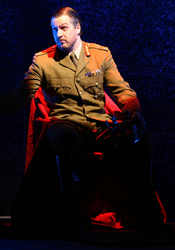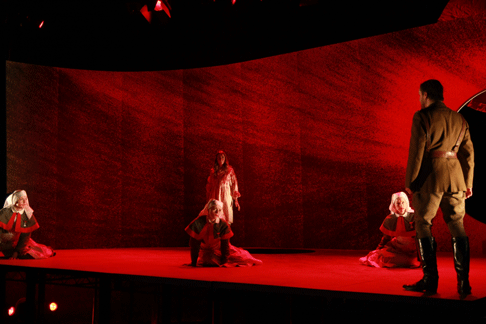30 Mar 2009
Bloch’s Macbeth by UC Opera, London
Mention Macbeth — The Opera and most think of Verdi. Ernest Bloch took on the subject more than half a century later, in Paris in 1910, when Verdi’s version was almost as obscure as Bloch’s is today.

Mention Macbeth — The Opera and most think of Verdi. Ernest Bloch took on the subject more than half a century later, in Paris in 1910, when Verdi’s version was almost as obscure as Bloch’s is today.
Originally the opera was composed to a French libretto by Edmond Fleg, but Bloch revisited the piece forty years later and adapted it to an English libretto, much of it Shakespeare’s own text. The French version of Bloch’s opera had its UK concert premiere in 1975 at the Royal Festival Hall, but it has never been performed here in the English version, nor in a fully staged production. Not, that is, until UC Opera — that champion of neglected masterpieces and justly forgotten flops alike — took it upon themselves to rectify the omission from the repertoire.
 George von Bergen as Macbeth
George von Bergen as Macbeth
This is an opera which concentrates on private moments, monologues and
dialogues; the sleepwalking scene is a private nightmare, without the usual
pair of onlookers. Far more of the play’s soliloquys survive than in the
libretto Piave wrote for Verdi; even the Drunken Porter makes an appearance,
with the opera’s one straightforward strophic song; a contrast in
word-setting which reflects Shakespeare’s own switch from blank verse to
prose.
The score is primarily reminiscent of Debussy in its often rather nebulous drift through the text, but has shades of Salome and Götterdämmerung as well. The student orchestra (UCL has no music department) was problematic: in a woodwind-dominated score, the wind and brass playing was at best weak and at worst excruciating. In his one-monologue cameo as Duncan, the distinguished veteran tenor Ryland Davies sang with a expertly-crafted lyrical arch to his phrasing which showed up the accompanying instrumentalists as being flat as a pancake beneath. The string playing was better, the basses making a particularly strong atmospheric impression with the darkly throbbing pizzicato in the scene immediately after Duncan’s murder. Charles Peebles, conducting, shaped the orchestration and choral singing as best he could; the final rhythmically-driven chorus in which all are united against Macbeth comes as a refreshing climax.
Bloch changes the order of the later scenes (Shakespeare’s Acts 4 and 5) giving an alternative slant to the plot: it’s not until after the (apparently motiveless) slaughter of Macduff’s family that Macbeth seeks the witches a second time, and they reveal to him only the parade of kings and the Birnam Wood prophecy. The other two prophecies are cut, so Macbeth’s only reason to fear Macduff is that he will be seeking to avenge his wife and children. It takes the tautness out of the structure: this is a play in which bad things definitely come in threes.
 Scene from Act 3
Scene from Act 3
And indeed, director John Ramster makes good use of the Witches (student soloists Mimi Kroll, Jessica Blackstone and Ella Jackson). They hover over the battle-slain like malign Valkyries, and travel as tree-spirits with the avenging army to see the final part of their prophecy played out. It’s a very strong staging all round, with space and lighting always used effectively; Bridget Kimak’s set is presided over by a blood-red moon, which moves into a total eclipse at the denouement — a strong visual evocation of the coming together of all the fateful prophecies which have governed Macbeth’s bloody reign.
The (hired) major principals were also strong — considerably stronger, in fact, than most of UC Opera’s casting in recent years. George von Bergen was especially good in the title role, dominating his every scene with a strong stage presence and full, finely-nuanced baritone. The young American mezzo Katherine Rohrer (Glyndebourne on Tour’s recent Carmen) has a lightish, agile voice with an excellent top; her Lady Macbeth was elegant and fiery, the progress of her self-destruction visible in her face. Richard Rowe sang Banquo in an even, well-produced tenor (his murder takes place offstage). The bass-baritone Carl Gombrich (National Opera Studio trained, now on the administrative staff at UCL) was a soft-grained Macduff, needing a little more heft and edge when urging the household to awake and hear the news of Duncan’s murder. Of the student soloists, tenor Hal Brindley’s Malcolm was the stand-out performance.
Ruth Elleson © 2009